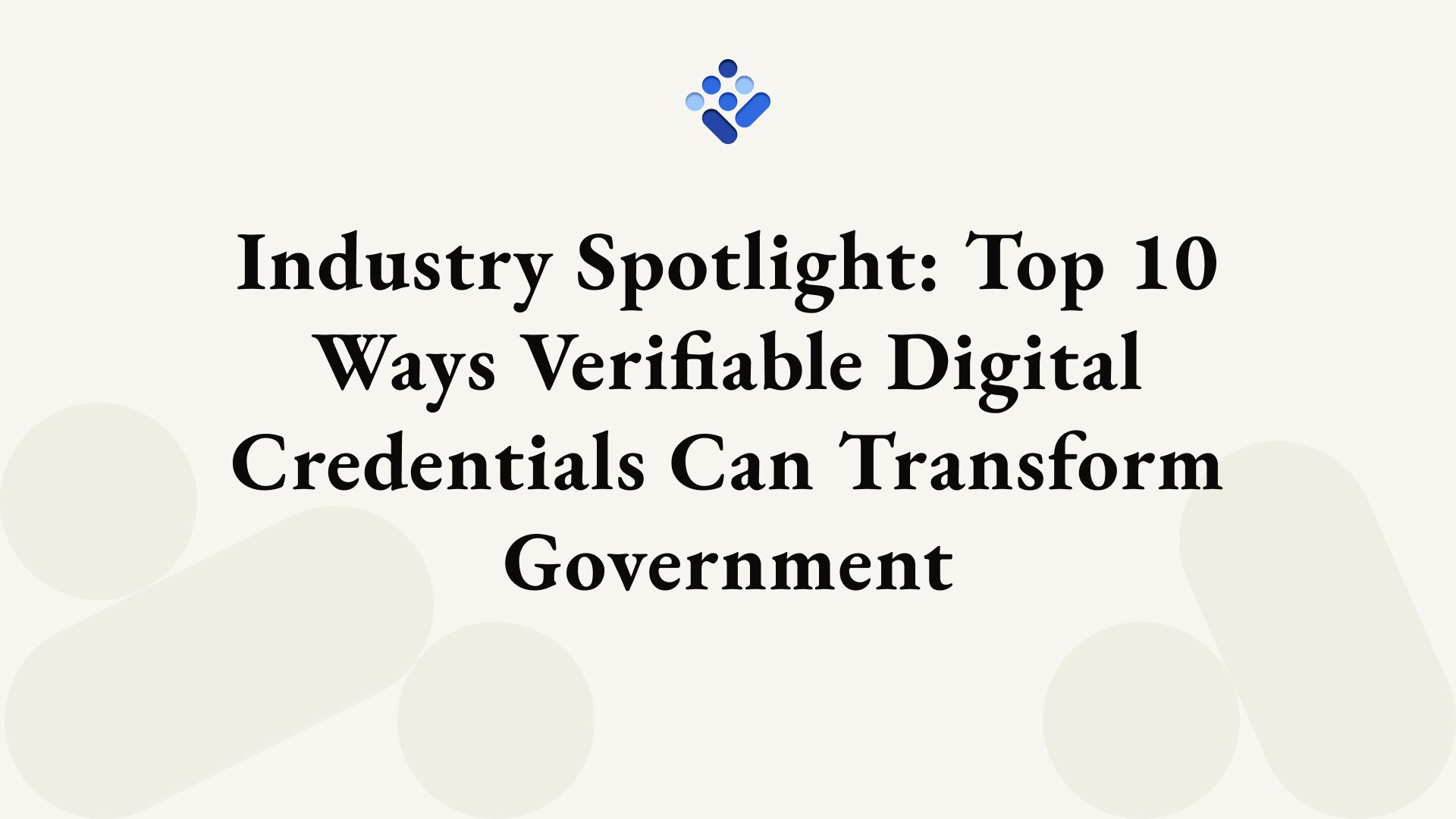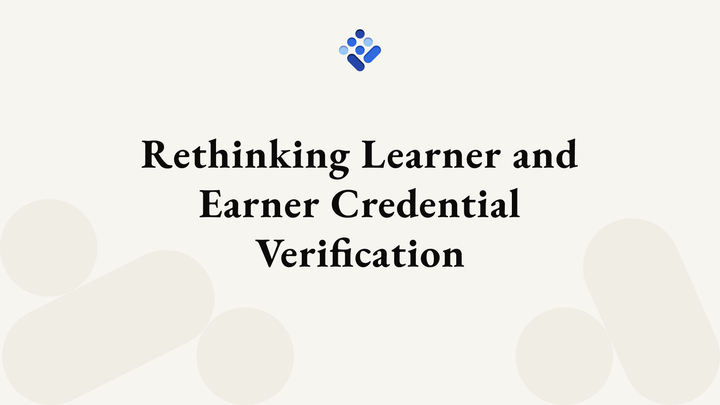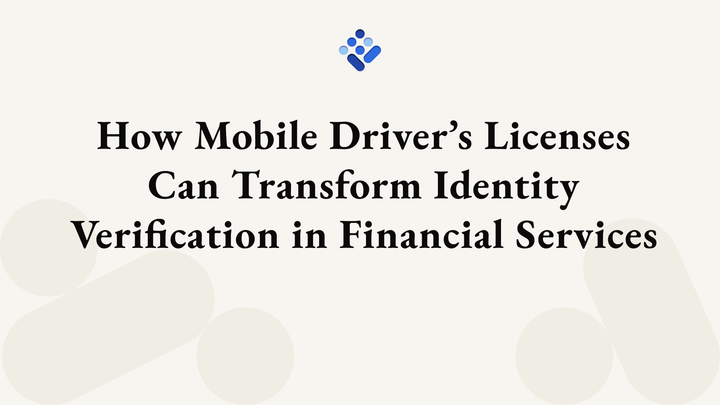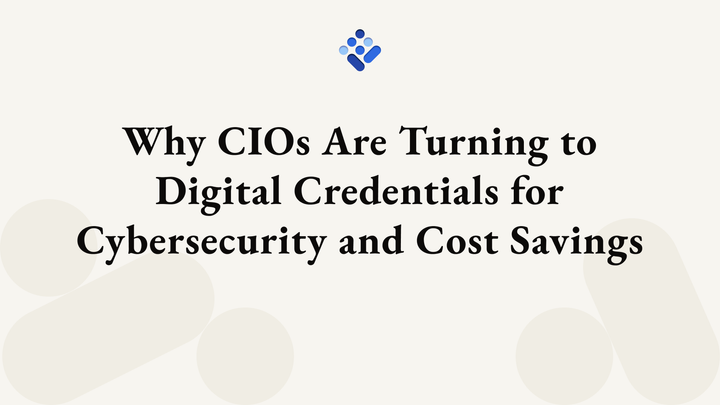Industry Spotlight: Top 10 Ways Verifiable Digital Credentials Can Transform Government
Explore how verifiable digital credentials can address challenges in government identity systems, offering secure, efficient, and privacy-focused solutions for a range of applications.

A Need for Verifiable Digital Credentials in Government
Government agencies face significant challenges in delivering secure, reliable identity credentialing and verification processes that are built for today’s digital world. Protecting residents' data from unauthorized access is essential, as is providing secure, accessible ways for residents to easily verify their identities across digital and physical channels as they go about their day-to-day.
The outdated, paper-based systems that exist today slow down government processes and introduce vulnerabilities, such as fraud, inefficiencies, and elevated administrative costs. These challenges not only affect the security and privacy of residents’ data, but also put a strain on government resources. We believe that to meet the demands of a digital-first society, agencies must transition away from paper-based credentials, which are vulnerable to tampering, to secure, verifiable digital credentials. Read on to learn more about the top 10 real world applications in government today, and how SpruceID is helping partner with agencies for digital transformation.
Today’s Top 10 Real-World Applications
When it comes to verifiable digital credentials in government, 10 use cases is just barely scratching the surface. However, the list below outlines several in-demand applications today where digital credentials bring significant advantages, greatly benefiting both government entities and the people they serve:
- Mobile Driver’s License (mDL): Physical IDs may be the norm, but they are easily lost, stolen, or damaged, making residents vulnerable to identity theft and fraud. Law enforcement, businesses, and government agencies spend valuable time verifying IDs, and the reliance on physical cards slows down services and increases errors. With high-assurance verifiable digital credentials (VDCs), verification becomes faster, more secure, and far less vulnerable to tampering with. The added convenience and security offered by a mobile driver’s license creates a streamlined, fraud-resistant environment where residents don’t have to rely on easily compromised physical cards. Read more about how SpruceID helped the State of California implement their mobile driver’s license program, and the benefits they’ve seen so far.
- Outdoor Licenses and Permits: Today’s outdoor licenses and permits (such as boating or fishing licenses) are largely paper-based, which are easy to lose or counterfeit, and enforcing them can be difficult. Conservation officers lack real-time verification tools, making enforcement difficult and allowing illegal activities to go unchecked. Digital permits with VDCs provide instant, reliable proof with an easy way to verify the credentials, supporting conservation efforts and reducing illegal activities—all while protecting public lands and waters. Learn about how SpruceID worked with Utah to launch digital off-road vehicle permits and how they’ve benefitted.
- Incarcerated Individuals and Criminal Justice and Law Enforcement: Today, approximately 27% of formerly incarcerated individuals are unemployed. This statistic highlights the significant barriers to employment these individuals face, particularly in accessing proper identification. The criminal justice system’s reliance on outdated, paper-based records not only creates vulnerabilities in identity management and record accuracy but also complicates access to essential rehabilitative services. These inefficiencies lead to security risks, identity errors, and hindered re-entry support. Verifiable digital credentials can help facilitate access to job applications, housing, and social services, while removing barriers to re-enter society and rebuild their lives.
- Marriage and Birth Certificates: Paper marriage certificates, birth certificates, and even social security cards are essential but vulnerable to loss, damage, and forgery, which complicates access to legal rights and government services. Verifying these documents can also be a slow process, creating roadblocks for individuals needing to prove familial status for health benefits, citizenship, and legal matters. VDCs ensure secure, instant access to these vital records, protecting individuals’ identities and preventing fraudulent claims. They can also help streamline processes such as enrolling your new baby onto your health insurance — as discussed in our recent blog post.
- Social Services Access (SNAP/Medicaid): Accessing social services with paper-based documentation is cumbersome and prone to errors. Individuals who qualify may face delays or rejections, while ineligible recipients can exploit the system, diverting funds from those in need. By using VDCs, agencies can improve efficiency and reduce fraud by allowing for real-time verification of eligibility, ensuring benefits reach the right individuals faster and reducing strain on the social services infrastructure.
- Civic Participation: Fraud and manipulation risks increase, threatening the integrity of civic participation such as responding to RFCs (requests for comments) or submitting feedback to political representatives. Verifiable digital credentials create a secure, accessible way to ensure that for example, someone is a resident and not a bot, without oversharing information. This approach has also been considered for simultaneously improving our voting systems’ security and engagement with the new generation.
- Land and Property Records: Paper-based land records can be misplaced, tampered with, or falsified, leading to property disputes, unclear ownership, and legal issues that impact families and businesses. To mitigate these issues and more, VDCs provide a secure way to manage property records, ensure property rights are protected, and enhance transparency in property ownership.
- Disaster Relief: In times of disaster, quickly verifying the identity and eligibility of individuals seeking relief is crucial but challenging with traditional paper documents. When someone loses their paper documents, aid can be delayed, misallocated, or vulnerable to fraud, hindering the response and leaving affected people without timely support. VDCs allow for quick, secure verification of those in need, ensuring relief reaches the right people and enable response teams to act efficiently during critical moments. Our credentials are accessible even in remote areas, without wifi or cell service.
- Government Employee Access and Verification: Current reliance on physical IDs for government employees and veterans can lead to unauthorized access, fraud, and security breaches. Verifiable digital credentials provide a secure way to verify identity of government employees such as military or veterans, protecting restricted spaces and sensitive information, while allowing instant access to necessary services and benefits that are exclusive to military and veterans, among other government employees.
- Cross-Border Travel Credentials: Physical cross-border travel documents such as customs clearance forms, visas, and health certificates and more are vulnerable to forgery and theft, creating security risks and causing delays at border crossings. VDCs offer a way to consolidate identity, customs, and health credentials into one streamlined verification process. This speeds up clearance, improves safety, and enhances global security and health compliance, delivering a more efficient experience for travelers and border authorities alike.
SpruceID’s Solution
SpruceID works with a variety of public sector agencies to issue verifiable digital credentials, creating a system of trust, security, and convenience that can be applied across numerous government applications. Our Credible platform supports issuing a range of digital credentials, from mobile driver’s licenses (mDLs) to professional certifications. These credentials use cryptographic digital signatures, ensuring that they cannot be falsified, shared through screenshots, or recreated by AI-generated deepfakes.
Our solutions prioritize minimal disclosure of personal data, enabling residents to verify credentials with only essential information (for example, only needing to show your age to enter a bar while keeping your personal address hidden). This keeps personal data secure and compliant with privacy regulations, all while eliminating government tracking or surveillance. In addition, Credible helps to drive increased efficiency, as digital processes streamline verifications and reduce administrative bottlenecks, ultimately saving time for both agencies and residents. By minimizing reliance on paper, agencies significantly lower overhead costs related to printing, mailing, and administrative handling, creating a cost-effective, privacy-centric solution.
Shaping the Future of Digital Identity in Government
We envision a future where government agencies fully leverage verifiable digital credential solutions that align with standards and advance alongside open-source industry collaborations.
Through partnerships with agencies such as the California DMV, we demonstrate our commitment to creating scalable, interoperable solutions. By embracing VDCs, government agencies can protect citizens, enhance services, and reduce administrative burdens, empowering everyone securely and efficiently. To learn more about how SpruceID could help your government agency, visit our website and get in touch with us.
About SpruceID: SpruceID is building a future where users control their identity and data across all digital interactions.




